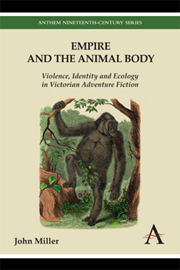Chapter Four - Wild Men and Wilderness
Published online by Cambridge University Press: 05 April 2013
Summary
Artificial Lives
In 1902 the American novelist and journalist Jack London, most famous for his canine tales White Fang and The Call of the Wild, embarked upon a journey into the depressed East End of London. Among the depiction of decay and hopelessness he presented in the following year's travelogue The People of the Abyss is a striking description of the bestial characteristics of Britain's urban poor. Unwisely walking the streets at night, London discovers a ‘nightmare, a fearful slime that quickened the pavement with life, a mess of unmentionable obscenity that put into eclipse the “nightly horror” of Piccadilly and the Strand’. ‘It was’, he concludes in a metaphorical leap from this slippery opening, ‘a menagerie of garmented bipeds that looked something like humans and more like beasts.’ In a moment that carries an echo of du Chaillu's confrontation with Africa's grotesque primates, he then adds zoological specificity to his image:
They reminded me of gorillas. Their bodies were small, ill-shaped and squat. There were no swelling muscles, no abundant thews and wide-spreading shoulders. They exhibited, rather, an elemental economy of nature, such as cavemen must have exhibited. But there was strength in those meagre bodies, the ferocious, primordial strength to clutch and gripe and tear and rend. When they spring upon their human prey they are known even to bend the victim backward and double its body till the back is broken. They possess neither conscience nor sentiment […] They are a new species, a breed of city savages. […]
- Type
- Chapter
- Information
- Empire and the Animal BodyViolence, Identity and Ecology in Victorian Adventure Fiction, pp. 149 - 182Publisher: Anthem PressPrint publication year: 2012

